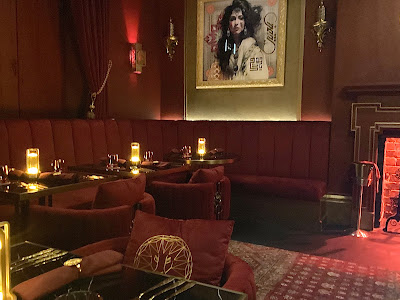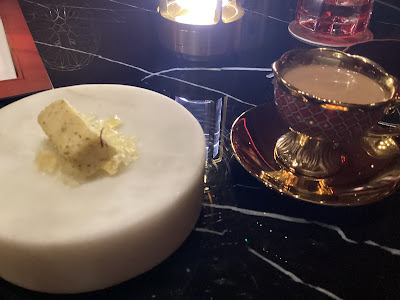In the 1990s I once travelled along some of the route of The Silk Road. Not so much of it I as intended - I started off in Peking, then I had a rather grim couple of nights in an awful hotel in Urumqi in Chinese Turkestan; the Muslim population, the Uighurs, there then not openly oppressed by the ruling Chinese as they are now. It was a fabulous, medieval walled city with barely any westerners to be seen apart from the small group with which I was travelling, all bustle and colour - that is - apart from our hotel, the name of which I have thankfully expunged from my memory, but which specialised in serving the most vile, unrecognisable and inedible food known to any civilisation.
 |
| An Imperial banquet in Peking at the start of the Silk Road, 1993. |
 |
| Sea cucumber, grey and unpleasantly gelatinous, served in Xian - never again. |
Our group was travelling on westwards along the Silk Route through the recently invented Kazakhstan but were forbidden from getting on to our aircraft for Alma Aty (now Almaty) because, so we were told, the country was closed because of an outbreak of bubonic plague. Well, that was exciting. Instead we headed back to Peking to stay in a modern, comfortable hotel with a delicious dinner before boarding a huge old Aeroflot plane taking us in the direction of Tashkent, the capital of the also newly invented Uzbekistan, the next morning. That was an adventure in itself as only a tiny portion, right at the front, of seats were available and with none of them being allocated, there was a mass scramble up the steps of the plane of Uzbekhs returning from what appeared to be shopping trips in Peking to their country and, with nothing of anyone’s baggage having been placed in a hold, all of them carrying the most extraordinary items into the passenger cabin including, I recall, refrigerators and chickens and ducks. Truly I had never been on a flight like that before and the surrealism of it all increased when a huge shot putter of a Russian air stewardess was forced to stand up and hold the cabin’s ceiling up during our take off and ascent after it fell down on top of some of the customers as we began to lift up from the runway.
This impressively menacing woman also had the role of distributing cardboard boxes containing extremely dubious fare for us to consume during the flight and she made her disapproval of me quite clear when I declined to accept one, using the excuse that I had filled myself at our predeparture dinner in Peking. Nor was the bizarreness over when we arrived in the middle of the night at Tashkent airport when one of our number, a dear little old lady in her late seventies I should think, was marched off by the Uzbek customs officers under suspicion of smuggling icons based on her ownership of a cheap piece of artisan art she had picked up in China. She was later restored to us and we headed off for the monstrous Hotel Uzbekistan, a ghastly remnant of the terrible Intourist hotels that the Soviet era Russians had built and run to make travelling as unpleasant as possible. There are some tales to tell about my stay at that hotel but not for now I think.
The food in Tashkent was again intolerable but we learned that the most sensible places to eat were the Korean restaurants which flourished in the city. These restaurants were a result of Stalin’s obsession with moving various communities away from their homes to other very distant parts of the Soviet empire and it so happened that he had ordained that Koreans should pitch up in Tashkent though it’s probable that only he understood the logic of it all.
 |
| Indulging in cultural appropriation in Bukhara? |
 |
| Tea and sweetmeats in Samarkand |
After Tashkent, the trip along part of the Silk Route really came alive as we crossed Uzbekistan by road calling in for stays in the fabulous city of Bukhara and a place, like Birmingham, that everyone should visit at least once in their lifetime, the magnificent Samarkand. We stayed a week and sampled much of the food and I at least had a passing acquaintance of the food of the Silk Road and afterwards, as a final fling of the surrealism of the whole trip, we flew to Moscow to find that the Parliament building there was surrounded by tanks under orders from Boris Yeltsin who was staging some sort of coup. Not that this bothered our guide. She was most upset when, on the last night of our trip, we had a farewell dinner at a rather pleasing restaurant, the name of which I have again forgotten (all this was thirty years ago and I did not take notes then) and having quaffed a bottle of Ukrainian ’Champagne’ she was told by the waiter that the restaurant had had just the one bottle and they could not supply us with a second. At least she had the right priorities.
So what’s all this waffle about the Silk Route? The relevance is this - I have paid a visit to the newly opened Baloci in Edgbaston (see Blog 371) which offers a ‘fine dining’ trip along the Silk Route, though the food it serves derives from further along the route than the cities I visited - Pakistan, Afghanistan and Iran (with the latter it is not surprising that this new restaurant is linked to Qavali which offers Persian food from its rather grand premises in Broad Street, see Blogs 191 and 268).
This is the second new Birmingham restaurant in the past few weeks - the other being Six by Nico in Colmore Row (see Blog 364) - to promote itself with the assertion that it is offering ‘Fine Dining’. The good points about Six By Nico are that the meal is relatively cheap, the venue is swanky, the staff are pleasant and numerous and the food at least looks ‘fine’; the negatives are that it is all too hectic - there is very little time to sit back and relax and enjoy one’s meal before one finds oneself at the end of the six courses, dishes are small - even for fine dining tasting menus, the quality and success of each course is variable. This is Faux Fine Dining - it has a veneer of fine dining about it but to experience it does not mean that the diner has had the experience that he would have were he in a true fine dining restaurant. It is hard to complain about this as the price of the meal is extraordinarily low but I believe the novice fine diner would be better served if he saved up his money for a while longer and then launched himself into the world of fine dining by eating in an establishment which can claim to be the real thing.
There’s an obvious difference (apart from the style of cuisine) between Six By Nico and Baloci and that’s the price - £39 for a tasting menu of six courses at Six By Nico, £100 for an eight course menu at Baloci (with an option for a cheaper six course experience). So did Baloci realise its Fine Dining intentions and was it as good as the publicity suggested?
I passed a thoroughly enjoyable two and half hours there. It’s clear that a lot of money has been spent on the refurbishment and the hotel offers two glitzy bars - the small ground level ‘Blue room’ into which the newly arrived diner is ushered to be offered a novel and delicious cocktail to calm themselves after their journey to the restaurant and prepare themselves in this swanky blue-lit little caravanserai before their gastronomic journey along the Silk Road, and the basement ‘Gold Room’ to which the diner is admitted at the end of their feast on the presentation of a ‘gold coin’ given to them by their waiter, and where another cocktail awaits them at the end of the travels. Whether or not all this physical journeying from bar to restaurant to bar is all a little overblown I’m not too sure but it’s harmless if nothing else and potentially quite good fun.
























No comments:
Post a Comment